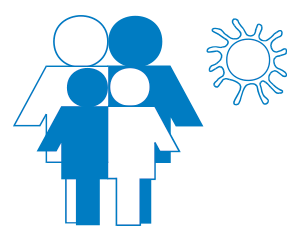Information package for child welfare agency administrators
National Survey of Child and Adolescent Well-Being Second Cohort (NSCAW III): Data Collection (Phase II)
Appendix C_Info package for CWS administrators_Brochure_final
Information package for child welfare agency administrators
OMB: 0970-0202
OMB
Control Number: 0970-0202
Expiration
Date: XX/XX/XXXX 

APPENDIX C: Recruitment Packet Brochure
N ational
Survey of Child and
ational
Survey of Child and
Adolescent Well-Being (NSCAW)
Frequently Asked Questions
An agency may not conduct or sponsor, and a person is not required to respond to, a collection of information unless it displays a currently valid OMB control number.
What is NSCAW? |
|
The National Survey of Child and Adolescent Well-Being (NSCAW) is a nationally representative, longitudinal study of children and families involved in the child welfare system (CWS). It is the country’s only source of national data on the well-being of children and families being served by the system. NSCAW examines child and family well-being outcomes in detail and seeks to relate those outcomes to experience with the CWS and to family characteristics, community environment, and other factors. |
|
Who is sponsoring this study? |
|
The study is sponsored by the Administration for Children and Families (ACF) within the U.S. Department of Health and Human Services. |
|
Who is carrying out this study? |
|
The study is being conducted by RTI International (RTI), an independent, nonprofit research organization headquartered in North Carolina. RTI is partnering with child welfare researchers at the University of North Carolina at Chapel Hill and Washington University in St. Louis. |
|
Have there been prior NSCAW studies? |
|
Yes. Two prior NSCAWs were launched about a decade apart—in 1999 and in 2008. If you agency participated in these national efforts, thank you! NSCAW was the first national study on maltreatment with information coming directly from children and their parents and caregivers.
|
|
How have the study findings been used? |
|
Study findings inform federal, state, and local policies and practices. Results have focused attention on the importance of trauma-informed practice and on the promotion of children’s social, emotional, and behavioral well-being. Findings have also illuminated the need for mental health services and for greater oversight of children prescribed psychotropic medications. NSCAW reports and research briefs are publicly available on the ACF website: http://www.acf.hhs.gov/programs/opre/research/project/national-survey-of-child-and-adolescent-well-being-nscaw |
|
How were Child Welfare Agencies chosen to participate in the study? |
|
A small number of agencies was selected scientifically to represent more than 3,000 agencies in the US. It is important that your agency participates so that your agency and others that your agency represents can be reflected in the study results. |
|
What will participating Child Welfare Agencies be asked to do? |
|
Agencies will be asked to:
|
|
How long will it take to complete these activities? |
|
We estimate that it will take approximately 3 hours for your agency to review all of the project materials and meet with NSCAW team to discuss your agency’s role, and about one hour per month (or 15 total hours) to prepare and submit the monthly sample files. If needed or requested, a subset of agencies may also take part in a 1 hour in-person visit to discuss the project.
|
|
What are the benefits of participation?
|
|
|
|
How will the child and family data contained in the sample files Child Welfare Agencies provide be kept secure? |
|
Sample files will be transmitted to RTI via a password-protected, secure website. Each participating child welfare agency will have a unique login and web page for submission of their monthly files. The protection of client data provided to the study is a top priority. RTI will maintain the privacy of all personally identifiable information (PII) provided by the agency to the extent permitted by law. Data will be transmitted and stored in such a way that only members of the project team who are authorized and have need will have access to any identifying information. All staff working on NSCAW must sign affidavits pledging that the data they will collect or work with will not be disclosed. Penalties for disclosure include termination of employment and financial fines. A detailed security plan for the protection of all NSCAW data is available upon request. |
|
|
|||
Per the Paperwork Reduction Act of 1995 (Pub. L. 104-13), the information collection efforts described below will be finalized upon review and approval by the Office of Information and Regulatory Affairs in the Office of Management and Budget. All recruitment efforts have been reviewed and approved (OMB No. 0970-0202; Exp Date XX/XX/XXXX). |
|||
|
|||
How many children from each agency will be included in the sample? |
|
Our goal is to include in the study approximately 55 children from each participating agency. In most agencies, we will randomly select 65-75 children over the course of 12 months to reach this goal. However, the number selected may be higher in a few agencies where fewer families express interest in participating. |
|
How will children be involved? |
|
The child’s involvement will vary depending on his or her age. A trained RTI field representative will observe and conduct standardized assessments on young children to assess their development and language skills. The field representative will talk with older children about their experiences at home and at school, their feelings about family and friends, and their exposure to violence. The representative will obtain signed permission from the child’s legal guardian before observing or talking with the child. |
|
How will parents and caregivers be involved? |
|
Field representatives will interview parents or caregivers (foster parents, relative caregivers, or others) about the child’s development, including learning skills, behavior, health, and social functioning. Parents and caregivers will also be asked about the services they receive, their environment, support systems, and parenting behaviors. All interviews will be conducted at the families’ homes or another convenient, private location. |
|
How will caseworkers be involved? |
|
The caseworker assigned to each selected child will be asked to participate in a face-to-face interview about the child’s history in the child welfare system, their family, the circumstances of the investigation, and services recommended or provided. The caseworker also will be asked to complete a short questionnaire about his/her work and background. |
|
How long will the interviews take? Do participants receive any tokens of appreciation? |
|
Assessments and interviews with children vary from about 60 to 90 minutes depending on the child’s age and experiences. Children ages 10 years and under receive a $10 gift card that is presented to their caregiver. Children 11 and older receive a $20 gift card. Interviews with the child’s parent or caregiver will last approximately 90 minutes. Parents and caregivers are provided $50 for their participation. Interviews with caseworkers last about 25 minutes. While caseworkers themselves will not receive a monetary incentive directly, all agencies participating in the study will receive an annual agency monetary token of appreciation. |
|
How will the privacy of the information be maintained?
|
|
RTI plans to obtain a federal Certificate of Confidentiality for this study to protect the identity of the research subjects. All staff working on NSCAW are committed to privacy and have signed an RTI Confidentiality Agreement. There is one exception: if a field representative or the project team member thinks the child’s life or health is in danger, they will inform the appropriate state or county agency. The participation of selected children and families is completely voluntary, and their participation in the study can be withdrawn at any time. Protecting the privacy of children and families is of utmost importance to the study. Participant names and other personally identifying information are never released or reported. |
|
Whom should we contact for additional information? |
|
Federal Project Officer Christine Fortunato Office of Planning, Research and Evaluation Administration for Children and Families U.S. Department of Health and Human Services 330 C Street, S.W. Washington, DC 20201 202-401-5460 |
RTI Project Director Melissa Dolan Survey Research Division RTI International 230 W Monroe, Suite 2100 Chicago, IL 60606 312-456-5247 |
| File Type | application/vnd.openxmlformats-officedocument.wordprocessingml.document |
| File Title | June 2003 |
| Author | Gary Whitaker |
| File Modified | 0000-00-00 |
| File Created | 2021-01-15 |
© 2026 OMB.report | Privacy Policy
